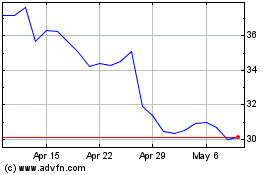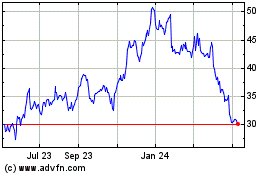By Corrie Driebusch and Maureen Farrell
Technology shares are struggling to regain favor with investors,
even as the rest of the U.S. stock market is back near record
heights.
Many of the industry's leading companies have followed up a
rocky start to the year with weak earnings reports this week and
are warning of more bleeding to come.
Business conditions for old-line tech stalwarts like
International Business Machines Corp. and Intel Corp. have grown
tougher, while Microsoft Corp. and Google parent Alphabet Inc.
disappointed investors with their results this week. In addition,
one of the sector's key sources of support -- successful
stock-market debuts by highly anticipated tech companies -- also
has dried up.
The result has been a selloff. Technology companies in the
S&P 500 fell 1.9% Friday, nearly erasing the sector's gains for
2016. Alphabet's 5.4% fall Friday was its biggest since October
2012 and wiped out $29 billion from its market capitalization.
Investors have pulled a net $4.5 billion from technology mutual
funds and exchange-traded funds in 2016 through the end of March,
according to Morningstar. That follows three years of net
inflows.
"The market is near all-time highs again, but I don't feel
good," said David Rudow, a senior equity analyst at Thrivent Asset
Management. "There's some good stuff out there, but it's not like
things are rosy and things are booming, especially in tech."
A slew of technology companies is scheduled to report results
next week, including Apple Inc., Twitter Inc. and Facebook Inc.,
whose stock has risen by double-digits the past two years. Apple is
currently projected to be the largest contributor to the tech
sector's first-quarter earnings decline, according to FactSet.
The initial-public-offering market, which typically juices tech
companies' stock prices, also dealt a blow to the sector this week.
SecureWorks Corp. ended a four-month-long drought in U.S.-listed
technology IPOs this week. But the cybersecurity firm's debut came
at a lower-than-expected size and valuation, and its stock opened
its first day of trading lower and ended the day flat.
"The technology IPO market was slow last year and will continue
to be slow this year," said Colin Stewart, head of technology
global equity capital markets at Morgan Stanley.
A strong debut by a new company can justify to investors that
its public peers also deserve higher share prices. In the past
year, however, shares of newly public tech firms have wobbled. A
number of closely watched tech IPOs are trading below their IPO
prices.
Gregory Becker, president and chief executive of SVB Financial
Group, the parent company of Silicon Valley Bank, which works with
start-up tech companies, said on a conference call Thursday that
IPO markets could remain weak for some time. Lower valuations for
privately held tech companies could instead drive M&A activity,
he said.
There are now at least 146 private companies valued by venture
firms at $1 billion or more, according to Dow Jones VentureSource.
Bankers and investors predict that only a minority of those
companies would consider debuting this year. Several mutual funds
have been slashing the valuations of privately held companies
recently. "If I had a great company that didn't need the capital
but could go public, this isn't the time to take it out," said
Tripp Jones, a general partner at the venture-capital firm August
Capital.
Even as publicly traded tech companies have traded lower,
investors in private companies and executives worry that companies
will struggle to match or exceed their most recent private
valuations. Yet late-stage private capital has been drying up,
which could push companies that need funding to go public.
"Companies are going to have to tap the public markets, because
the alternatives in the private markets are going to be punitively
dilutive, " Mr. Jones said.
Executives on recent corporate earnings calls have highlighted a
slowdown in tech spending due to concerns about the health of the
global economy, which adds to uneasiness, analysts said. Fears of
slowing global growth shook financial markets at the start of 2016,
leading to a dropoff in business spending.
The slowing of spending on tech isn't necessarily going to last
forever, said Hari Srinivasan, research analyst for the Neuberger
Berman Global Equity Research Department.
"If the global environment doesn't go through any shocks and
continues to recover slowly we could see tech spending come back in
the second half of the year," he said.
The tech-heavy Nasdaq Composite fell 15% from the start of the
year to Feb. 11, while the S&P 500 fell about 11% during that
period. While both indexes have bounced off their lows, the Nasdaq
still remains in the red for 2016. It's a big reversal from past
years. In 2015 the Nasdaq ended the year up 5.7%, while it rose 13%
in 2014 -- outperforming the S&P 500.
Even with recent declines, the technology sector isn't cheap,
analysts say, which makes it harder to justify scooping up shares.
Technology companies in the S&P 500 currently trade at an
enterprise value -- which includes debt and equity -- that is 11.6
times its past 12 months of earnings before interest, tax,
depreciation and amortization, according to FactSet. That is up
from a year earlier and well above the group's 10-year average of
9.8 times.
(END) Dow Jones Newswires
April 22, 2016 21:07 ET (01:07 GMT)
Copyright (c) 2016 Dow Jones & Company, Inc.
Intel (NASDAQ:INTC)
Historical Stock Chart
From Mar 2024 to Apr 2024

Intel (NASDAQ:INTC)
Historical Stock Chart
From Apr 2023 to Apr 2024
